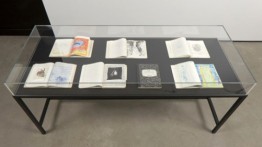Paul Thek (A'54) at the Modern Institute
POSTED ON: May 23, 2012

Cooper Union alumnus and former faculty Paul Thek (A’54) was recently honored with a major exhibition at Glasgow’s Modern Institute. Running through June 6, 2012, If you don’t like this book you don’t like me, presents 35 of Thek's notebooks accompanied by artworks which give the context of time and location. The notebooks were made by Thek after the significant Technological Reliquaries series he made between 1964 and 1967, and were a reaction to the creation of the art objects he had been making.
Unlike many of his contemporaries in the 1960s who were making work regarded as minimalism, Paul Thek’s work was messy, representational and auto-biographical and involved personal insight and spirituality. A sculptor, painter, and one of the first artists to create environments or installations, Thek came to visibility showing his sculptures in New York galleries in the 1960s. The first works exhibited,Technological Reliquaries, which he began making in 1964 are sometimes referred to as ‘meat pieces’ as they were meant to resemble flesh. At the end of the sixties, Thek left for Europe, where he created extraordinary environments, incorporating elements from art, literature, theatre, and religion, often employing fragile and ephemeral substances, including wax and latex.
Images from the show are available on Contemporary Art Daily.




